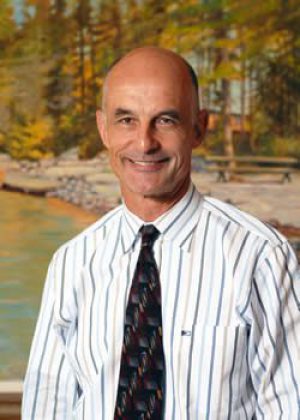Lessons I learned from Professor Robinson

Professors are supposed to teach you something. As his graduate student and colleague for over 35 years, I learned plenty from Ed about pulmonary physiology, mechanisms of disease in recurrent airway obstruction (RAO) of horses, inflammatory mediators, innervation of airways and more.
But while important, these were not his most important lessons. Ed never sat me down to teach me the life lessons that I learned from him. Those were experiential lessons that I learned by working with him in the laboratory.
“A chap doesn't do that.” As the saying goes, there are many ways to skin a cat, and Ed and I often talked about various strategies that we might use to accomplish a goal. Sometimes reaching a goal the quickest involved taking shortcuts that I might not want to tell my mother about. When I suggested such an approach, Edward would thoughtfully say “A chap doesn't do that.” He never explained what a chap actually does or doesn't do, but the message was clear: live your life with integrity.
As he ages, Ed resembles his father Norman more and more. I first met Norman when he was in his 80s traveling with Ed to a scientific meeting in Dubai. I remember our research team of about a dozen young people having dinner with Ed and Norman. Norman was the center of our conversations because of his obvious enjoyment of life, his curiosity about our science, and his terrific sense of humor. These characteristics must be in the genes, because Ed is just like his dad in these regards.
Every day at work I could expect the characteristic “Ed Robinson knock” on my office door, with Ed barging in enthusing about a data set, a new hypothesis, or an idea about a new project. We would discuss the new idea, often critically, and soon he would be off in a cloud of enthusiasm to pursue the next step. Today, when I contemplate new directions I always think about the enthusiasm and joy one must have to do a good job in any endeavor. I've learned from Ed that if it isn't fun, it isn't worth doing!
In his “last lecture”, Ed talked about reaching high and being critical. This was the order of the day in the Pulmonary Laboratory. I must admit, that interacting with Ed was not always fun and games. My ideas for new projects were analyzed critically and only the very best ideas survived a first review by Ed. Even today, sending the first draft of a paper to Ed invites lots of red ink and often humbling critique. I have learned from Ed that a culture of reaching high and being critical, while sometimes uncomfortable, is absolutely essential for the excellence in science expected from professors at a major research institution like Michigan State University.
Nowadays, when I contemplate various approaches to reach a goal, and when I'm close to a decision, I always ask myself the question “would a chap do this”? The answer to this question has been an important beacon for me.
In any close collaborative relationship, people don't always agree with one another. Indeed, as a department chair I've been dismayed more than once when faculty members collaborating in productive research or clinical programs develop disagreements that eventually destroy their programs. Ed and I didn't agree on everything, and sometimes we even felt slighted by one another. But we never let things fester, we discussed the issue, and Ed was always able to defuse the situation with his charm, self- deprecation, and terrific humor. His sense of humor was particularly powerful! Ed is able to see the humorous side of most situations, and often we would come out of a disagreement joking about the circumstances and laughing at ourselves. While I will never be able to match Ed's sense of humor, I have learned that humor can be a powerful tool.
Those of you that have attended Ed’s lectures or presentations will have noted that his lectures always go off as planned and that these presentations appear easy for him. Don't be fooled by this! Ed spends numerous hours preparing his lectures and presentations. He would read the literature critically, we would discuss how to interpret the literature, and then he would prepare his presentation. Ed would then deliver his draft presentation to our laboratory team and he would demand unbridled critique. Presentations were often rehearsed a second or third time. Since both Ed and I have a competitive nature, we would take great joy in criticizing one another's work, sometimes shocking new graduate students by our candor. But the end result of this approach was that Ed’s presentations were always the highlight of any meeting. From Ed I learned the importance of doing your homework. In the words of NFL Quarterback Charlie Batch: “Proper Preparation Prevents Poor Performance.”
Through the lessons Ed taught veterinary students, graduate students, colleagues and administrators, he has left a lasting impact on many people and he has immeasurably enhanced the quality of veterinary medicine and science at Michigan State University. All of us who have had the privilege of learning from Ed are grateful for the man and the lessons that he taught. Best wishes, Ed, for a wonderful journey through the next phase of your life. I know that, like your dad, you will continue to live life to the fullest.
Your grateful student,
Frederik J. Derksen DVM, PhD
Chair, Department of Food Science and Human Nutrition
Michigan State University
